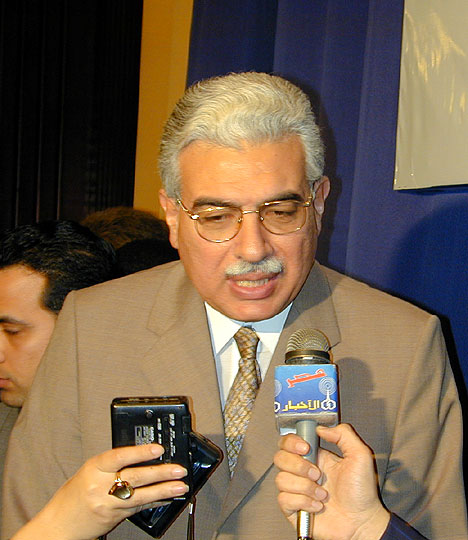|
|
register now
for site updates
(type your email here)
|
|
|
|
|
|

|
|
|

|
|
|
|
|
| |
Ready, set internet!

Minister of Communications and Information Technology Ahmed Nazif is deluged by reporters after his address to the 'Information Technology and Telecommunications in the Arab World' forum
Dispatch
Filed by Tarek Atia
March 19, 2001
At a large Arab IT conference, the mood is upbeat, despite the dot-com bust.
Organized by Egypt's International Economic Forum, the conference brings together industry professionals, government
officials, and international
business and IT luminaries to the Conrad hotel on the Nile.
Together, they stand in the ruins of the dot-com bust, and yet there is a drift of optimism in the air.
And why wouldn't you be optimistic? Egypt, and the Arab world, had IT and internet penetration so low
and the potential for growth so high, only a fool wouldn't give the new economy a try.
And in case anyone attending the Accessing New Horizons conference on IT in the Arab World still had any doubts,
John Scully, the former CEO of Apple Computer, was there to soothe them. "One should not be misled that the meltdowns
of the dotcoms have anything to do with what we're talking about at this conference."
Frankly, it was all anyone was talking about. Then again, how could it not be? The NASDAQ had gone down nearly 60
per cent. A mere 4.3 trillion dollars!
Ironically, it was the very same dot-com boom that preceded the crash that will bring us that much closer
to the elusive goal of complete wireless connectivity. Panelist after panelist confirmed the forecast:
No one was touching anything that was dot-com and didn't have a decent business plan for now,
but a huge amount of money had already been invested in developing advanced infrastructure technology, the cables,
bandwidth and optics that would take us to that next level, sooner than we expected it to, and hopefully not too late
for the Arab world.
As a result, the air was mixed with both the excitement over discovering virgin territory, and fear of the dark
clouds racing behind.
It was ground-zero on an all-important question, which Scully asked the audience: As Arabs, when it comes to the
all-encompassing future of IT, are you going to be reactive or proactive?
Scully remembers a moment just like this, in his own life. He was the CEO of marketing at PepsiCo at the time,
the golden boy who took the company to the top thanks to an aggressive new snack food venture. He was coasting along until his
friend Steve Jobs, who had just invented the Apple computer, asked him to leave Pepsi and come on board at Apple.
Scully hesitated, said no, and Jobs asked him, "Do you want to sell sugar water for the rest of your life, or do you
want to help me change the world?"
He did, and Scully -- the wizard of marketing -- helped Apple grow from a $100s of million per annum firm to an
$8 billion one.
A few hours later, the conference attendees had Scully's optimism profoundly shattered by Emad Eddin Adeeb, the
maverick multi-media journalist who seemed more than a little distressed by the dot-com bomb. Although grim about it, Adeeb
said he was in the game for good. He'd put too much of his effort, money and reputation at stake. "I'm going to
be short, depressing and to the point," said the owner of web portal Good News For Me, who is also a famous talk show host on Orbit TV and the editor of newspaper
Alam Al-Youm. He proceeded to bombard the gathered throng with the same question
again and again. "How big is your market?"
Despite the growth, the Arab market was small, and it would stay that way for a while. And as the small players slowly disappeared,
strength would be found in alliances. In fact, it was "alliances or death," according to Adeeb, who also noted
that the concept of alliances was never popular in the Arab world.
Adeeb, like Jobs, had a profound question for everyone in the audience to ask themselves: "Do you want to be a
chairman of a losing company, or a coffee boy in a successful one?"
Changing Arab minds
Find out what the conference decided
Chatting with visionaries
Read interviews with Virginia Secretary of Technology Donald Upson, former Apple CEO John Sculley, and Arabia.com founder Khaldoon Tabaza.
Did you like this article? Send your comments to comments@cairolive.com
|
|
|